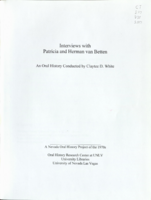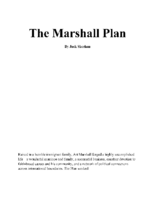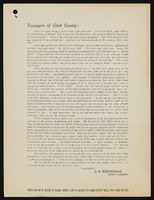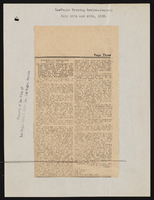Search the Special Collections and Archives Portal
Search Results

Transcript of interview with Pat van Betten by Claytee White, February 6, 2007
Date
Archival Collection
Description
Patricia and Herman van Betten met in Pittsburg through their volunteer work on the John F. Kennedy Campaign. After their Connecticut wedding and Herman's studies at the University of Texas and the University of Southern California, they and three small children moved to Las Vegas. Their fourth child, a native Las Vegan, was born in 1968. In 1967, Herman acquired a position at the Nevada Southern University, which is now the University of Nevada, Las Vegas. Beginning in the 1970's the couple worked diligently to make the Las Vegas community a great place to live. They participated in The League of Women Voters, The Consumer League, the Welfare Rights Movement, and the Community of a Hundred. Patricia served as the President of the Consumer League and Herman was elected to the local school board. They were jointly appointed by the ACLU as Civil Librarians of the Year, 1990-1991. Currently retired, they engage in civic, environmental, and historical activism in the village of
Text

Book, The Marshall Plan, by Jack Sheehan, 2013
Date
Description
Art Marshall is one of the founders of the Marshall-Rousso chain of women's dress shops that started in casinos in Las Vegas. He is also a banker, a member of the Nevada Gaming Commission, is active in the Anti-Defamation League and the Jewish Federation of Las Vegas, is an art collector, and is a philanthopist, especially for Jewish faith-based causes and for the University of Nevada, Las Vegas.
Text

Rocio Rodríguez-Martinez oral history interview: transcript
Date
Archival Collection
Description
Oral history interview with Rocio Rodríguez-Martinez conducted by Elsa Lopez and Monserrath Hernández on June 21, 2019 for the Latinx Voices of Southern Nevada Oral History Project. Rocio shares her personal history growing up in Bogotá, Colombia and how she immigrated to the United States. She talks about motherhood, her Latina identity, and her experiences raising her daughter in Los Angeles and Las Vegas with her husband. Rocio also discusses her employment history and how she was able to achieve her professional goals of becoming a Spanish and English teacher for the Clark County School District (CCSD)'s Family and Community Engagement Services (FACES) program. Her interview is conducted in Spanish. Subjects discussed include: Bogotá, Colombia; El Salvador; Family and Community Engagement Services (FACES).
Text

Transcript of interview with Harold R. Hunter by Philip John Mile, March 19, 1978
Date
Archival Collection
Description
On March 19, 1978, Philip John Mile interviewed former chef, Harold R. Hunter (born 1901 in Norwich, Kansas) about his life in Southern Nevada. Hunter discusses his different experiences working in early Las Vegas restaurants during the thirties and forties. Hunter also discusses the rapid growth of the Mormon community during this time.
Text

Transcript of interview with Lori Chenin-Frankl by Barbara Tabach, June 7, 2016
Date
Archival Collection
Description
Lori provides a wonderful narrative of her Judaism, her love of teaching children and her devotion to family and music. She talks about growing up in Las Vegas and becoming a bat mitzvah, a rarity for girls in 1973. Throughout her life, including the period where she moved around with her Air Force husband, she sought Jewish connections to help her feel at home no matter where she was.
Text

Transcript of interview with Louis Evans by Jeannettte Lonpergan, February 17, 1976
Date
Archival Collection
Description
On February 17, 1976, Jeannette Lonpergan interviewed well driller and dairy worker, Mr. Louis Evans (born on August 8th, 1914 in Jones County, Iowa) in his home in Las Vegas, Nevada. Mrs. Lonpergan’s husband, Mr. Dennis Lonpergan, was present during the interview and joined in on the discussion. Mr. Louis Evans’ wife, Mrs. Evans, was also present during the interview. Mr. Evans relocated to Nevada from Iowa in search of employment. Construction on the Hoover Dam had begun at this point; Mr. and Mrs. Evans recall their earliest recollections of Nellis Air Force Base and McCarran Airport. The interview covers the history of Nevada from Mr. Evans’ perspective. Mr. Evans discusses the paving of roads, employment, religious activities, housing developments, early above ground atomic tests, social and environmental changes and mining in Nevada.
Text

Maria Paloma Galvan oral history interview: transcript
Date
Archival Collection
Description
Oral history interview with Maria Paloma Galvan conducted by Claytee D. White on October 30, 2017 for the Remembering 1 October Oral History Project. In this interview, Galvan discusses the evening of October 1 as a Lyft driver. She recalls hearing gunfire while at the Luxor Hotel and Casino driveway and driving people away from the area. Galvan describes driving a wounded man to Sunrise Hospital and the scene there. Lastly, Galvan discusses the Las Vegas community after the tragedy, and her attitude on gun laws.
Text



